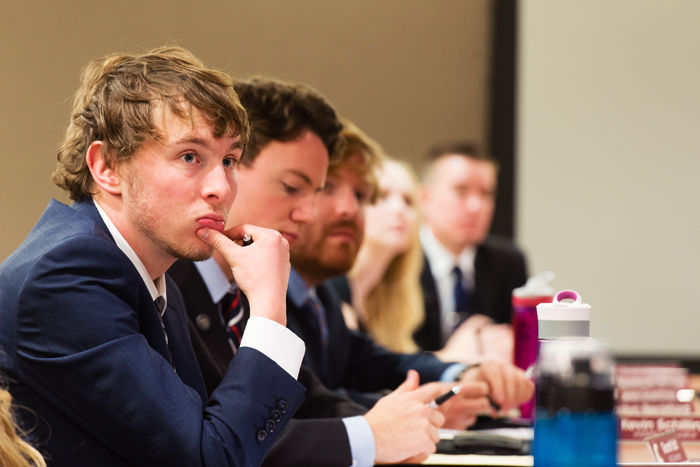ASWSU bill to extend referendum deadlines passes with amendment
January 21, 2017
The bill to extend the referendum deadline passed at the ASWSU special Senate meeting Friday, after an hour and a half of discussion among the senators.
Bill 46-27 passed with 12 senators in favor. Sens. Austin Brown and Kevin Schilling were the only two to vote against. The bill, along with an amendment, changes the deadline for referendums to be proposed from 30 school days before the election to 15.
As it was originally written, the bill would have shortened the deadline from 30 school days to 10, but the amendment, created during the meeting, changed it to 15 school days.
The special meeting was called 30 school days before the election, meaning that any organization or senator wishing to propose a referendum now has an additional 15 more school days to do so. Had the bill not passed, the deadline would have been Friday.
The meeting opened with a reading of the proposed bill and an explanation from the bill’s author, Senate Pro Tempore Garvin Price. Price said he wrote the bill to reflect the current operating procedures. Several senators cited last year’s student media fee referendum, which they said was submitted after the deadline, as evidence that this bylaw was not being practiced and that changing the deadline would reflect current ASWSU procedure.
Sen. Victor Charoonsophonsak, the co-sponsor of the bill, said the Senate had a responsibility to help the organizations that had approached them about referendums but had not yet submitted them.
“Think about the two other organizations who have come to us,” Charoonsophonsak said.
Schilling reminded the senate that the 30-day deadline was in no way a “hidden policy.” If the senators and organizations want their referendums to be effective and be debated, he said, they should have proposed them to the Senate last semester.
“I live by deadlines,” Schilling said. “It is not our fault that referendums have not come before us before this deadline.”
Schilling also asked why the bill was introduced so late if it was really about efficiency and not just extending the deadline. Price responded that he had written the bill during the first week of the spring semester, but because of a canceled Internal Committee meeting and the closure of campus on Wednesday, the special meeting fell on the day of the deadline by coincidence.
Sen. Matthew Murrow said the bill was torn “between efficiency and accountability.”
Other arguments against the bill included that lowering the deadline would not give the Senate enough time to debate proposed referendums or for the Judicial Board to declare whether referendums are constitutional.
Sens. Garish Chummun and Brown both said their constituents were not happy with the idea of new student fees. Honors College Delegate Savannah Rogers and Sen. Josue Zuniga both said that if their constituents were against a referendum then those constituents could vote against it on the ballot during the election.
“Why are we getting to choose?” Rodgers said “Allowing referendums to go on the ballot is our job and [the students’] choice.”
Price said this bill was in no way connected to any potential referendums and was not designed to extend the deadline for “some people.” He said he didn’t want to “[change] the bylaws for one instance,” but instead “for the future.”
Chummun was the first senator to bring up a possible athletics connection to the proposed change in deadline, which was speculated on earlier in the week. As WSU President Kirk Schulz said in September 2016, the athletics department may be proposing a referendum to add a student fee, which would help cover the department’s $13 million budget deficit.
Price reassured the Senate that the bill was “100 percent not connected to athletics.” Brown then asked Price and Charoonsophonsak if someone from the athletics department had reached out to them, to which they both said no.
Price said he wrote the bill because 10 days is “long enough” and 30 days is “excessive” to discuss proposed referendums before the ASWSU election in March.
Sens. Alyssa Norris and Derrick Wallace said they supported the bill because there was not enough time between the end of winter break and the deadline for senators and organizations to write referendums.
“It’s very important that we have well-written referendums,” Norris said.
Norris said she is also still writing her own referendum and had not known of the deadline before discussion about it began this week.
Sen. Jordyn Beckford was the first to suggest amending the deadline to 15 school days before the election instead of 10.
Sen. Murrow officially proposed the 15-day amendment and it passed with all but one “nay” from Schilling.
The final vote included only 14 senators because Beckford was not permitted to vote since she arrived late to the meeting and had not been present when the bill was read.
After the meeting, when asked why he voted against the bill, Brown said that changing policies at the last second “raises ethical questions.” He speculated that something is going on and that he believes the athletics department reached out to someone on the Senate about the department’s potential student fee referendum.
“I am unaware of any bill regarding extending the deadline and it is not something athletics has requested,” Associate Athletics Director Bill Stevens said in an email.
Stevens did not confirm or deny whether the athletics department will be proposing a referendum, but said it continues to be “a point of conversation” going forward.










